- Home
- Franklin W. Dixon
Into Thin Air Page 3
Into Thin Air Read online
Page 3
All true. Cal Nevins, the gruff ride operator and childhood friend of Hector’s, had disappeared as soon as we made it clear that we had reason to suspect him. And both Luke and Kelly said it was Cal who’d cared for them in the wake of their “disappearances”—until he disappeared himself.
I let out a slow sigh. I hate, hate, hate catching the wrong guy.
But had we done it this time?
Greg looked from Frank to me, seeming to read the uncertainty in our faces. “I’d also like you to think about why we contacted you today,” he said.
I raised an eyebrow. Was he serious? “To get out of jail?” I asked sarcastically. “Yes, I wonder why you’re saying you’re innocent? How unusual!”
Greg didn’t have any visible reaction. “We only get out of jail if you catch the real criminal,” he said. “We understand the criminal justice system well enough to know that. So there’s no benefit to us in contacting you unless we’re really innocent.”
I was still trying to wrap my mind around that when Derek spoke again. This time his voice was hoarse and serious.
“That young girl, Daisy, disappeared last night,” he said.
Frank nodded. “She disappeared on the ride, just like Luke and Kelly.”
Derek’s eyes widened. “But we are in here,” he pointed out. “Don’t you see? Whoever’s behind these disappearances is still out there. While we rot away with the drug dealers and scum of the earth, the true criminal is running loose, causing real harm.”
Frank shook his head. “But Daisy’s disappearance is different,” he said. “She was never in the little crawlspace under the ride. It sounds like this is a different crime, for a different criminal.”
“Or is it a different crime from the same criminal?” Greg asked, tilting his head. “Maybe it’s not a different person—maybe it’s the same person, now moved into a different phase of whatever terrible thing he has planned.”
A chill went down my spine when he said that. A different phase of whatever terrible thing . . . There was no denying that a person who’d faked Kelly’s and Luke’s disappearances as some kind of prologue to Daisy’s real disappearance—and whatever else he had planned—was a lot more sinister, and scarier, than some bozo committing a copycat crime for attention.
I considered this for a moment before meeting Greg’s eyes.
“We behaved inappropriately,” he said. “We realize that now. We took advantage of the disappearances. We were callous and cruel. We tried to use a real crime to gain publicity for our creation.” He stopped and leaned closer to me. “But she could get hurt,” he said. “It’s crucial that you understand the ugly truth of this crime. It isn’t a copycat crime. I fear it’s something far darker.” He paused. “Do you understand?”
I glanced at Frank. He was staring at the table, deep inside his own mind. I knew he, too, was turning what the Piperatos had told us over and over, trying to make sense of it.
“We understand,” I said.
• • •
I wondered where Daisy was as we walked out of the jail into the startlingly bright midafternoon sunlight. I wondered so hard my head hurt and I couldn’t focus on anything else. It’s such a waste, I remember thinking. I can put so much thought and brainpower into trying to save her, and still not save her. I can wish myself into knots hoping that she’s safe, and she might not be safe.
The Piperatos’ message hadn’t made me feel any better, or any closer to finding the person who’d taken Daisy. Instead it made the world feel much bigger and darker, and much harder to understand, than it had just moments before we’d stepped into the jail.
Frank and I do what we do because we want, in an unsentimental way, to make the world a better place.
But what if we hadn’t this time?
What if we’d made it worse?
“I believe them,” Frank said, suddenly stopping dead a few yards away from our car. I could tell he’d been thinking this over since we’d left the visitation room.
“I think I believe them too,” I said, sighing.
Frank nodded. We kept walking to the car, both still lost in thought, and Frank unlocked the doors and started to climb in just as I pulled my door open and saw something that sent raw terror blooming through my gut.
“Frank!” I screamed. “Stop! Get back!”
In the driver’s seat, coiled like a snail’s shell, but with a hissing, toothy head protruding, was a live rattlesnake.
JUNGLE FUN!
5
FRANK
I DIDN’T THINK I COULD get any more shaken up after hearing what the Piperato Brothers had to say about Daisy’s disappearance.
But it’s funny how finding a live rattlesnake in your car really wakes you up and forces you into action.
“HOLY . . . ,” I managed, staring at the slithering, hissing beast that coiled precisely where I’d been about to slide my butt just seconds ago.
“Close the door, Frank!” Joe yelled from the passenger side. “Close it!”
He was right. Of course he was right. I slammed the door on the reptile invader and backed away.
“Look!” Joe said. He was pointing at the windshield, where a small white note fluttered, pinned facedown by the left wiper. It took me a minute to be brave enough to approach the car again, but I reminded myself that the snake was inside, the note was outside. I grabbed the tiny paper and backed away again.
“What does it say?” Joe asked, running around the car to join me on the driver’s side.
I looked down, then held it up so he could read:
I TOLD YOU TO STOP LOOKING.
Joe stared at the note, then stepped back and shook his head. “Well. Awesome.”
• • •
A few hours later we were back at the Bayport PD, having spent a couple of hours dealing with the cops, then animal control. Our slithery friend had been taken into custody and examined, while animal control officers searched missing animal reports. It turned out that our unwelcome visitor was none other than Poky, an elderly rattlesnake that lived at Funspot’s long-running Jungle Fun! exhibit. According to his handlers, Poky was a really super-nice rattlesnake who was enjoying living out his golden years on a steady diet of mice and occasional cuddling. He wasn’t super interested in biting people.
I still did not like him. And I really did not like whoever had stuck him in my car.
Officer Fernandez led us through reception and into Chief Olaf’s office, which was empty. I looked at Joe and sighed. When Fernandez responded to our call, he’d been reluctant to let us go after making our initial report, claiming that there were some “things we need to discuss” back at the station. Apparently these things needed to be discussed with the chief. This day was just getting better and better.
Fernandez told us to sit and then said he’d go get the chief. A couple of minutes later Chief Olaf came back alone. He closed the door and walked over behind his desk, looking at the two of us with a serious expression.
“Boys,” he said. “I take it you survived the rattlesnake attack?”
I tried to smile. “It turns out Poky isn’t much of an attacker.”
The chief nodded. “Nevertheless,” he said. “I was told that there was also a threatening note, the text of which was . . .” He paused and pulled a piece of lined paper out of his pocket. “ ‘I told you to stop looking.’ ”
He looked from the paper to us.
I looked at Joe.
I wasn’t really sure what to say.
Chief Olaf let out a long, slow sigh. “Boys, it sounds like you two might be doing some investigating. And someone is clearly aware of that fact and has started threatening you.”
Joe cleared his throat and sat up. “We’ve had our eyes and ears open, sure,” he said. “But we’ve been careful so far.”
The chief nodded and looked from Joe to me. His frank stare was a little unnerving. He sighed again. “Even so, for your own safety, I’m going to ask you to suspend your investigation.”
<
br /> But there are just some things Hardys can’t do. For us, not sleuthing was like not living.
Especially in this case . . .
Joe looked upset. He squirmed in his chair and then said, “Chief?”
Olaf looked at him patiently. “Yes, Joe?”
Joe sighed, clearly frustrated. “It’s just . . . we really care about Daisy. And we really want to try to find her. Isn’t that, maybe, sort of understandable?”
I looked at the chief, curious how he would react. He touched his temples and looked down.
“I could understand that,” he said, looking up to meet Joe’s eyes. “But boys, I need you to listen to me. You’re being threatened. We know that things aren’t always perfect in this town. You need to leave this case to the professionals—for your own good.”
Joe frowned. He seemed to listen to the chief, but he clearly didn’t like it. “But—” he said, squirming again.
“For your own good,” Chief Olaf repeated. He shook his head. “Look, you boys were lucky this time. But I don’t want to have to explain to your parents why you were attacked by rabid dogs or pushed off a cliff! Are we clear?”
Joe sighed. I caught his eye, and subtly nodded.
“We’re clear,” Joe said, obviously not happy about it.
“We’re clear,” I echoed.
Olaf nodded. “Good,” he said. “Now, I believe Officer Fernandez has some paperwork for you to sign regarding the rattlesnake. After that, I’ve been told your car has been examined and deemed safe, so you can head home.”
We stood and followed the chief out of his office and down the hall toward Fernandez’s desk, near the reception area. The officer looked from Olaf to us and nodded. “Boys,” he said, pulling a manila folder off his desk. “I just need your John Hancock on a few forms, and you’re free to go.”
Olaf gave us a quick wave and disappeared back toward his office. Joe and I sat at Fernandez’s desk and quickly started passing the forms back and forth. I didn’t know about Joe, but I was ready to be home. I hoped Aunt Trudy had worked up some kind of super-comforting comfort food for dinner.
Fernandez watched us sign. “So,” he said in a low voice, too low to be heard by anyone else in the office, “you boys been checking out the Funspot case?”
I looked at Joe, wondering if we should share any information with Fernandez. And I had no idea why he was asking.
Joe met my eye and furrowed his brow. “We might have heard some things,” he said noncommittally, signing away.
“Hmm,” Fernandez said, looking around, then back to his computer. We signed a few more forms before he spoke again. “You find out anything?” he whispered.
Joe stopped signing and looked at me. I had no idea what to say. Should we—
“Stop it! You’re hurting me! I said I can walk myself!”
I started at the familiar voice. Could it be?
“I want to talk to my lawyer! I know my rights!”
I looked up at the door. Two big, burly officers were struggling to lead in a cuffed—and angry—Hector Rodriguez!
Joe had looked up now and his mouth dropped open, the pen falling from his hand to Fernandez’s desk. “Is that . . . ?”
Fernandez looked up and grinned. “Yup. That’s your buddy Hector Rodriguez.”
Joe ducked a little, and I followed suit. I don’t know why, but I didn’t want Hector to know we were witnessing this.
“What did he do?” I asked.
The officer sniffed. “He’s innocent until proven guilty,” he said, glancing at his computer and clicking around. “But it says here he was brought in on an assault charge. Guy says he showed up at his door and attacked him.”
“Who was the guy?” Joe asked.
Fernandez clicked again. “Some guy named Douglas Spencer.”
CRIES FOR HELP
6
JOE
AND WE’RE BACK AT DOUG Spencer,” Frank said as we pulled into our driveway. The lights were on in the kitchen, sending out a comforting yellow glow, and at the sight of them I really couldn’t wait to have a nice hot dinner and then climb into bed. I was exhausted, and I needed a break from all the horrible thoughts that kept swirling about Daisy and what might have happened to her.
“But we know next to nothing about him,” I pointed out, opening up my door and climbing out of the car. “Except what Penelope said.”
“Which was what?” Frank asked, looking thoughtful. I couldn’t blame him for forgetting. Lunch seemed like a million years ago.
“He didn’t want to sell Funspot, and he was giving Daisy creepy looks when he came by the house,” I replied. Side eye, she’d called it. I really had no idea what to make of it, still. Was it a sign that Doug Spencer was dangerous? Or were his looks just innocent curiosity?
Frank nodded as we walked toward the house.
“So what do we do?” I asked. I was almost too tired to think about it.
Frank smiled. “We do what we always do when we have a little bit of a clue, but not enough of a clue to know what to do.”
When I looked at him wonderingly, he went on, “We do an Internet search.”
• • •
“Why would Hector attack Doug?” I asked as we settled down in front of Frank’s computer. Aunt Trudy, God bless her, was downstairs putting the finishing touches on an organic butternut squash lasagna. The smell—sort of sweet, sort of cheesy—was like a warm blanket wrapping me up in homey comfort.
Frank opened up his Internet browser. “Good question,” he said as his favorite Internet search site came up. “We’ve been thinking about grudges Doug might have against Hector. But why would Hector want to attack Doug?”
I swallowed. “It had to involve Daisy,” I said. “We know Hector, and he’s not a violent guy. The only reason I can think of that Hector would try to hurt someone is to defend his child.”
Frank frowned, looking pensive. “Hector does have a criminal record, remember,” he said. “He may not be a violent guy, but he wasn’t exactly a choirboy in his youth. Remember how he had a few run-ins with the law?”
I sighed. “He seemed so eager to leave that behind, though.” I shook my head. “I think it’s Daisy. I feel like Hector must have had some reason to suspect Doug of having something to do with her disappearance.”
Frank clicked on the search box and typed in “Doug Spencer, Bayport.” “Let’s see,” he said, and clicked on the search button.
• • •
It took hours to wade through all the results. First we had to sort out the hits that referred to our Doug Spencer—the former owner of Funspot—and not Doug Spencer, the World War II veteran, or Doug Spencer, the young hermit crab enthusiast. Then we broke for dinner. Then we came back to filter out the ones that had bad, or irrelevant, or repetitive information.
Most of what we found had to do with Funspot. Doug Spencer had owned the park for almost thirty years. There were tons of photos and nostalgia sites for the Funspot of our youth, the well-kept, cute amusement park that I could remember our parents taking Frank and me to visit. But one link led Frank to an interesting discovery.
“ ‘Douglas Spencer, 45 Lincoln Road, Bayport,’ ” he read. “And here’s his phone number.”
I nodded. “Seems worth a ride over there,” I suggested, even though I was having trouble keeping my eyes open.
“But wait—look,” said Frank, jumping back to the search results and scrolling down to a different one. It was the website for the local Kiwanis Club, a public service club that met once a month. Doug Spencer was listed as an active member.
“Look at the meeting time,” Frank whispered, pointing.
It was the second Saturday of every month—which would be tomorrow.
“If we wait till tomorrow morning, we can check out his house when he’s not home,” I said.
Frank nodded. “I think that’s the way to go,” he replied. “Though I guess you could argue, if he really is keeping Daisy in his closet, he might not show
up for the Kiwanis meeting.”
I shivered. I knew Frank was kidding, but I hated to think of Daisy being kept in a closet.
My brother glanced at me, and his brow furrowed with sympathy. “Sorry, Joe. Look, let’s both get some sleep. We need it. Then we’ll leave the house tomorrow by eight thirty. Sound good?”
I nodded. “It’s a plan,” I said, dragging myself off the edge of Frank’s bed and shuffling toward my room. “G’night.”
“Night,” Frank called after me. Once I was in the hall, he added, “Joe?”
“Yeah?”
His voice took on a tone of certainty. “We’ll find her,” he said.
I gulped. I wanted to believe my brother, but I just wasn’t sure. “See you in the morning.”
• • •
I thought I’d be too keyed up to sleep again, but I guess my body knew better: Within seconds of my head hitting the pillow, I fell into a deep sleep. I awoke with the sun streaming through my window and a puddle of drool on my pillow. I slowly rose up, stretched, and looked around. I couldn’t remember dreaming at all—for which I was grateful.
I checked my phone: seven thirty. Just enough time to shower, throw on clothes, and wolf down some of Aunt Trudy’s steel-cut oatmeal before we ran out the door. I grabbed some jeans and a T-shirt and stumbled into the hall. Frank’s bedroom door was open, so I poked my head in.
“Hey,” I called. My brother was sitting at his computer, peering at the screen, fully dressed. I wondered how long he’d been up.
“Hey,” he replied, turning around. “It looks like Doug Spencer doesn’t live luxuriously.” He pointed to the screen, where his map website showed an image of 45 Lincoln Road. I stepped inside to take a closer look.
The house was small, with white-painted clapboard that was flaking off in places, and a roof that seemed to sink in. The yard was small but tidy. In the background I could see the house behind, which was in worse condition, junk littering the yard.
“Strange,” I murmured. “I know Hector paid less than Doug wanted for Funspot, but it should have been enough for Doug to buy a nice house, at least.”

 The Great Pumpkin Smash
The Great Pumpkin Smash Who Let the Frogs Out?
Who Let the Frogs Out?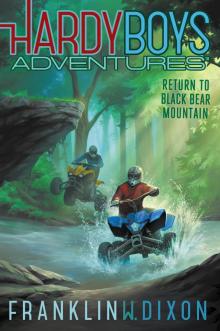 Return to Black Bear Mountain
Return to Black Bear Mountain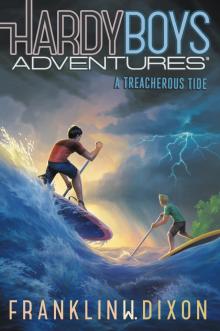 A Treacherous Tide
A Treacherous Tide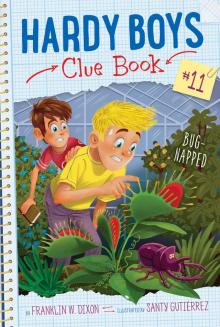 Bug-Napped
Bug-Napped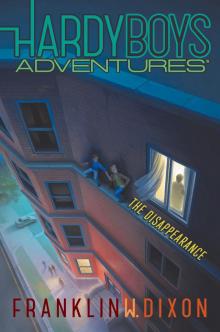 The Disappearance
The Disappearance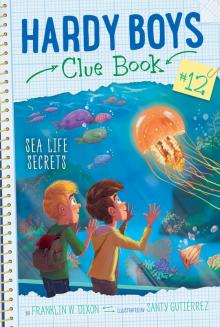 Sea Life Secrets
Sea Life Secrets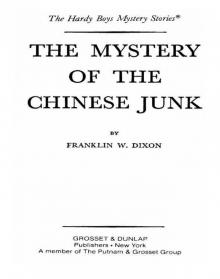 The Mystery of the Chinese Junk
The Mystery of the Chinese Junk A Skateboard Cat-astrophe
A Skateboard Cat-astrophe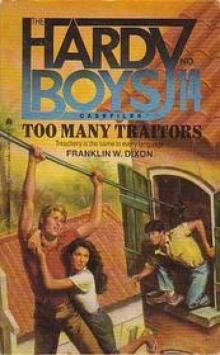 Too Many Traitors
Too Many Traitors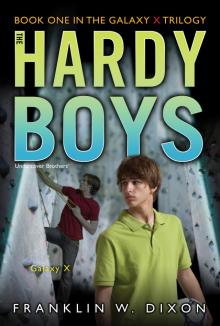 Galaxy X
Galaxy X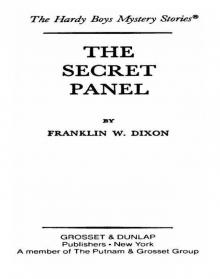 The Secret Panel
The Secret Panel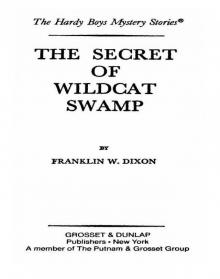 The Secret of Wildcat Swamp
The Secret of Wildcat Swamp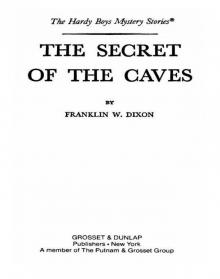 The Secret of the Caves
The Secret of the Caves The Caribbean Cruise Caper
The Caribbean Cruise Caper Without a Trace
Without a Trace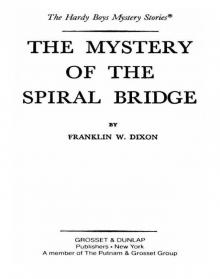 The Mystery of the Spiral Bridge
The Mystery of the Spiral Bridge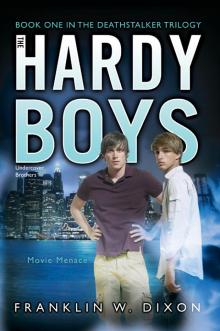 Movie Menace
Movie Menace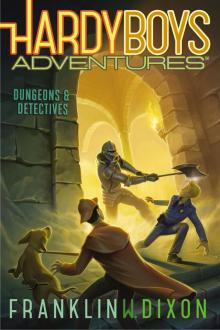 Dungeons & Detectives
Dungeons & Detectives Water-Ski Wipeout
Water-Ski Wipeout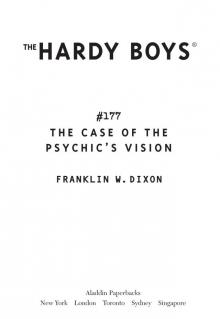 The Case of the Psychic's Vision
The Case of the Psychic's Vision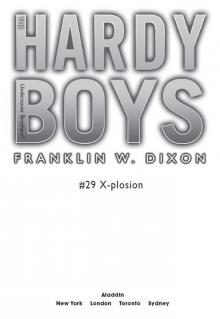 X-plosion
X-plosion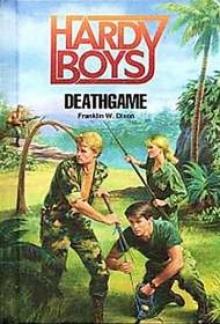 Deathgame
Deathgame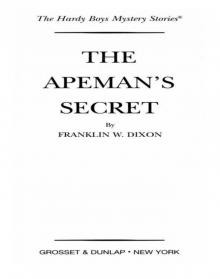 The Apeman's Secret
The Apeman's Secret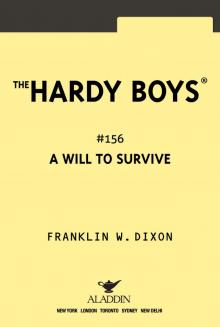 A Will to Survive
A Will to Survive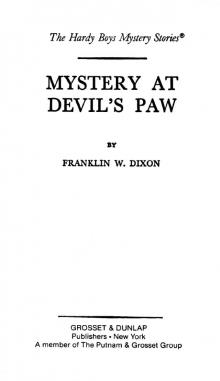 Mystery at Devil's Paw
Mystery at Devil's Paw Blood Money
Blood Money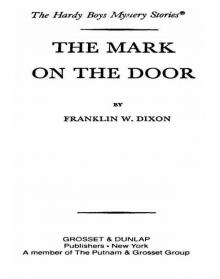 The Mark on the Door
The Mark on the Door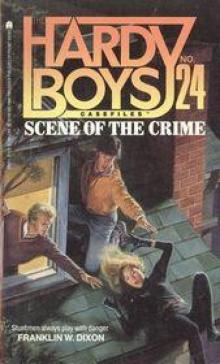 Scene of the Crime
Scene of the Crime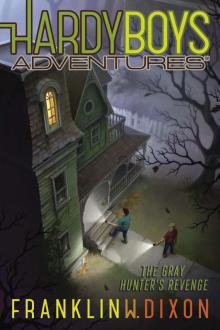 The Gray Hunter's Revenge
The Gray Hunter's Revenge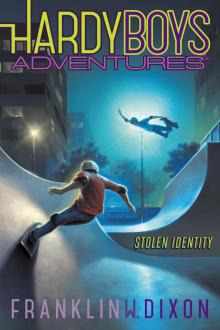 Stolen Identity
Stolen Identity The Mummy's Curse
The Mummy's Curse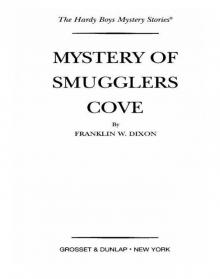 Mystery of Smugglers Cove
Mystery of Smugglers Cove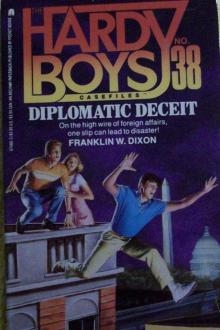 Diplomatic Deceit
Diplomatic Deceit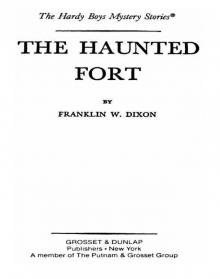 The Haunted Fort
The Haunted Fort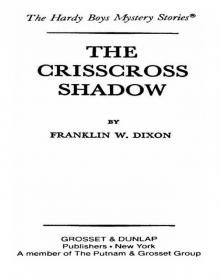 The Crisscross Shadow
The Crisscross Shadow Secret of the Red Arrow
Secret of the Red Arrow Trial and Terror
Trial and Terror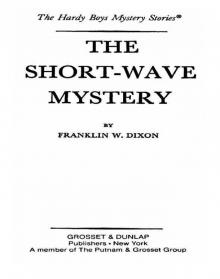 The Short-Wave Mystery
The Short-Wave Mystery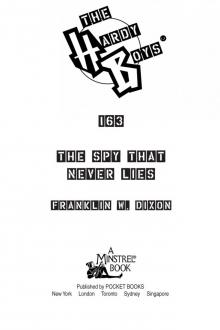 The Spy That Never Lies
The Spy That Never Lies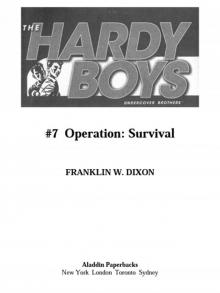 Operation: Survival
Operation: Survival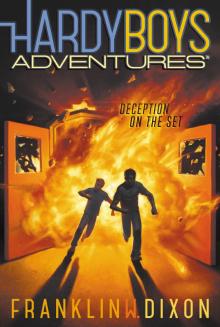 Deception on the Set
Deception on the Set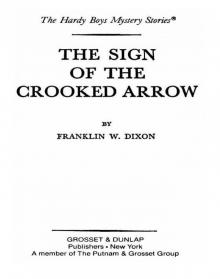 The Sign of the Crooked Arrow
The Sign of the Crooked Arrow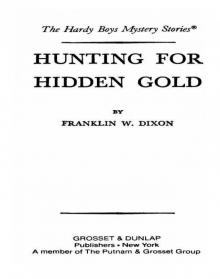 Hunting for Hidden Gold
Hunting for Hidden Gold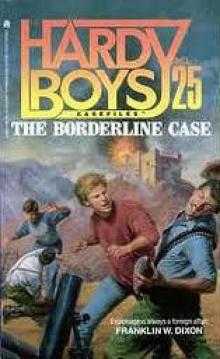 Disaster for Hire
Disaster for Hire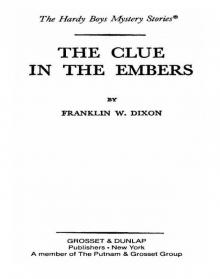 The Clue in the Embers
The Clue in the Embers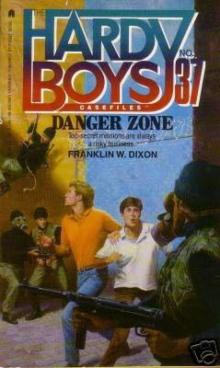 Danger Zone
Danger Zone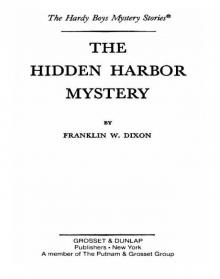 The Hidden Harbor Mystery
The Hidden Harbor Mystery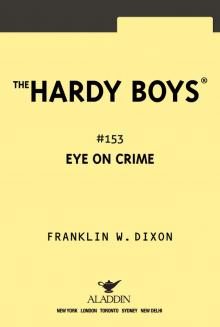 Eye on Crime
Eye on Crime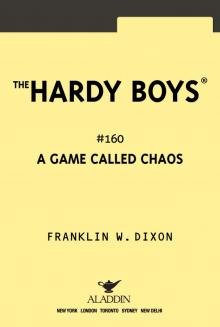 A Game Called Chaos
A Game Called Chaos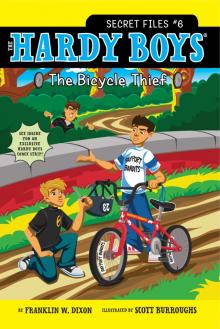 The Bicycle Thief
The Bicycle Thief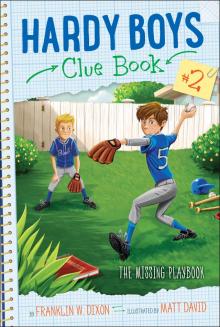 The Missing Playbook
The Missing Playbook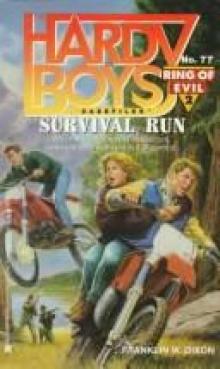 Survival Run
Survival Run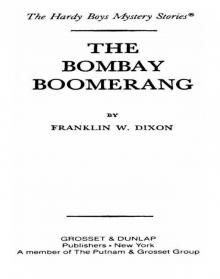 The Bombay Boomerang
The Bombay Boomerang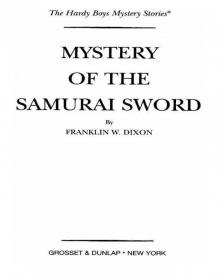 Mystery of the Samurai Sword
Mystery of the Samurai Sword Burned
Burned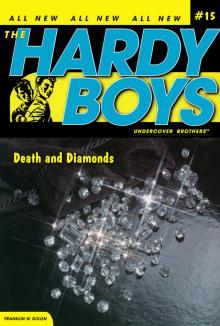 Death and Diamonds
Death and Diamonds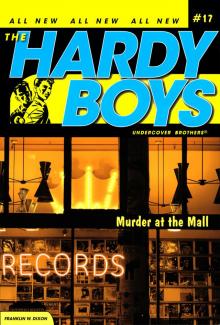 Murder at the Mall
Murder at the Mall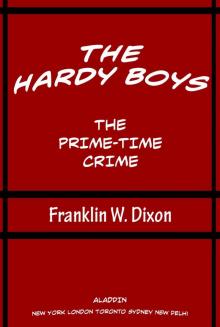 The Prime-Time Crime
The Prime-Time Crime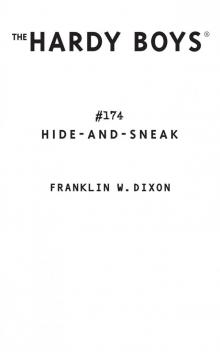 Hide-and-Sneak
Hide-and-Sneak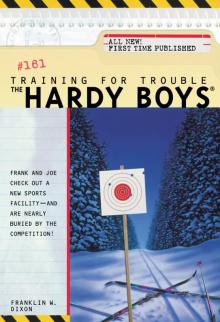 Training for Trouble
Training for Trouble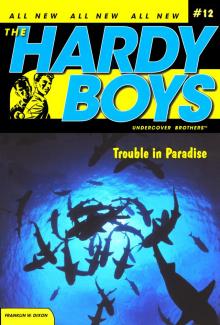 Trouble in Paradise
Trouble in Paradise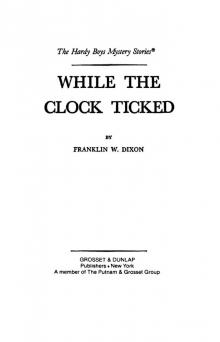 While the Clock Ticked
While the Clock Ticked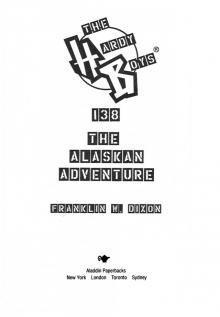 The Alaskan Adventure
The Alaskan Adventure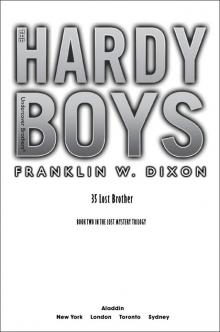 The Lost Brother
The Lost Brother Tunnel of Secrets
Tunnel of Secrets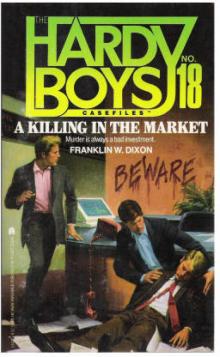 A Killing in the Market
A Killing in the Market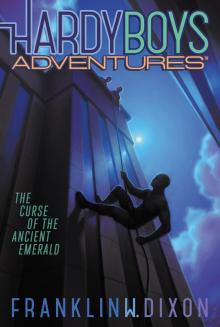 The Curse of the Ancient Emerald
The Curse of the Ancient Emerald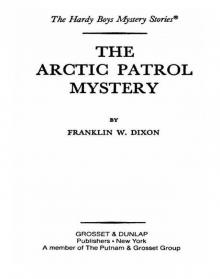 The Arctic Patrol Mystery
The Arctic Patrol Mystery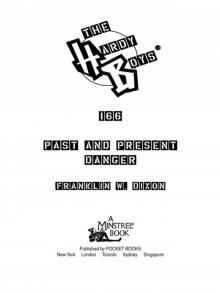 Past and Present Danger
Past and Present Danger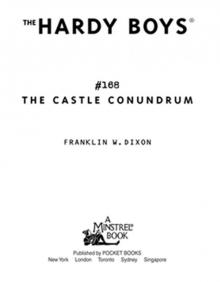 The Castle Conundrum (Hardy Boys)
The Castle Conundrum (Hardy Boys) Farming Fear
Farming Fear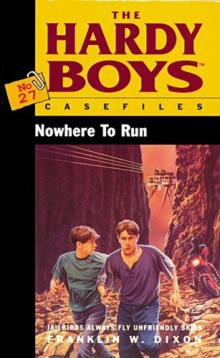 Nowhere to Run
Nowhere to Run The Secret of the Soldier's Gold
The Secret of the Soldier's Gold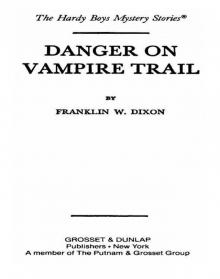 Danger on Vampire Trail
Danger on Vampire Trail The Lure of the Italian Treasure
The Lure of the Italian Treasure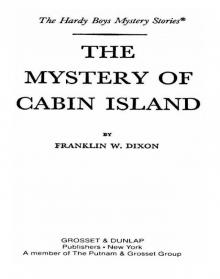 The Mystery of Cabin Island
The Mystery of Cabin Island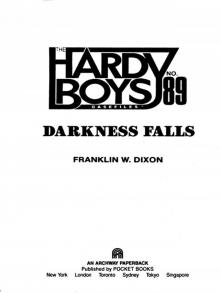 Darkness Falls
Darkness Falls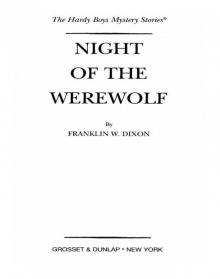 Night of the Werewolf
Night of the Werewolf Danger in the Extreme
Danger in the Extreme The Lazarus Plot
The Lazarus Plot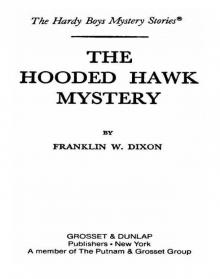 The Hooded Hawk Mystery
The Hooded Hawk Mystery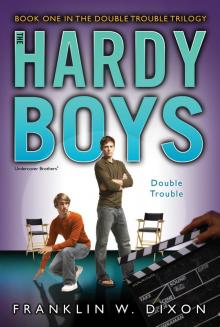 Double Trouble
Double Trouble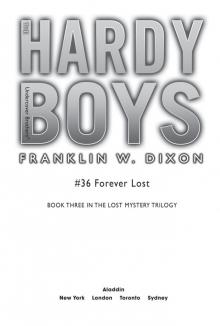 Forever Lost
Forever Lost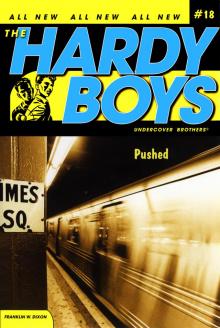 Pushed
Pushed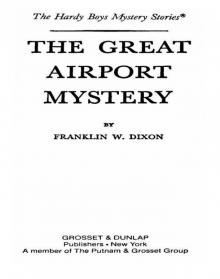 The Great Airport Mystery
The Great Airport Mystery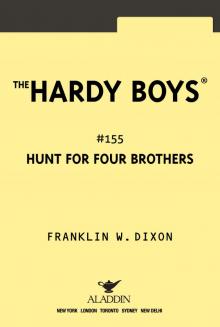 The Hunt for Four Brothers
The Hunt for Four Brothers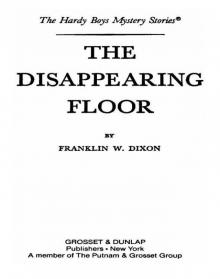 The Disappearing Floor
The Disappearing Floor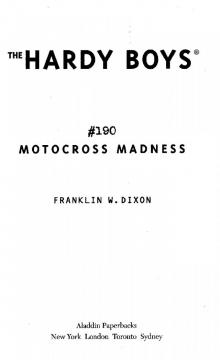 Motocross Madness
Motocross Madness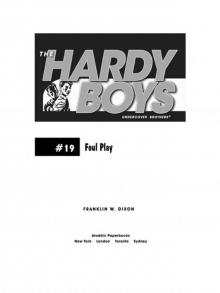 Foul Play
Foul Play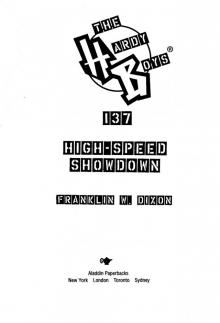 High-Speed Showdown
High-Speed Showdown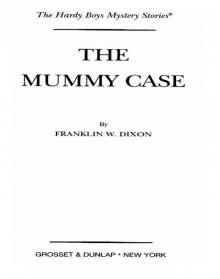 The Mummy Case
The Mummy Case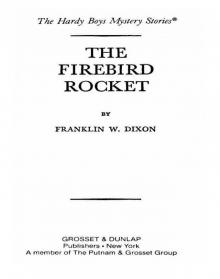 The Firebird Rocket
The Firebird Rocket Trouble in Warp Space
Trouble in Warp Space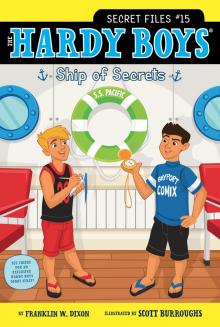 Ship of Secrets
Ship of Secrets Line of Fire
Line of Fire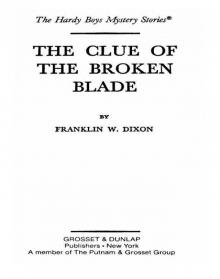 The Clue of the Broken Blade
The Clue of the Broken Blade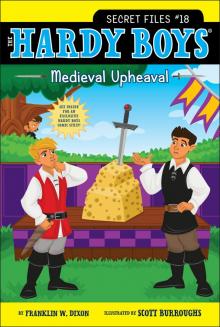 Medieval Upheaval
Medieval Upheaval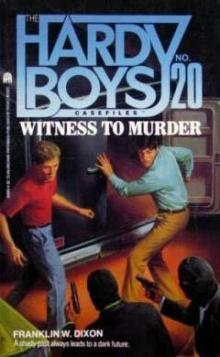 Witness to Murder
Witness to Murder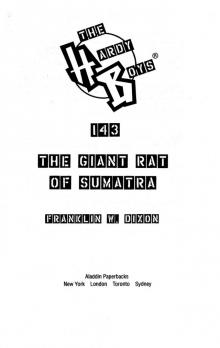 The Giant Rat of Sumatra
The Giant Rat of Sumatra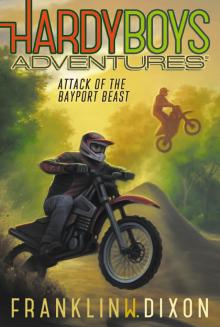 Attack of the Bayport Beast
Attack of the Bayport Beast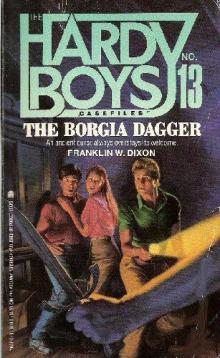 The Borgia Dagger
The Borgia Dagger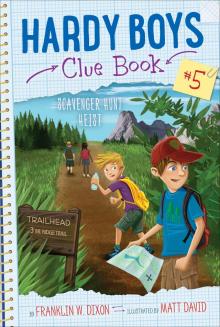 Scavenger Hunt Heist
Scavenger Hunt Heist No Way Out
No Way Out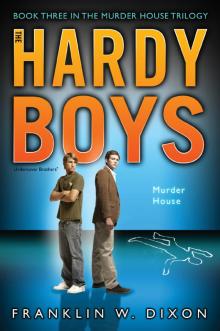 Murder House
Murder House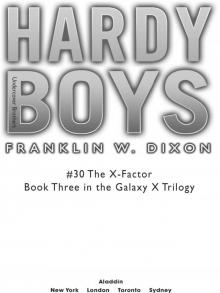 The X-Factor
The X-Factor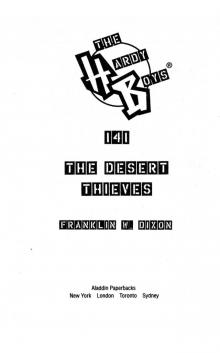 The Desert Thieves
The Desert Thieves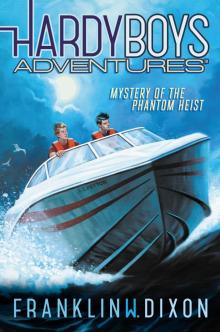 Mystery of the Phantom Heist
Mystery of the Phantom Heist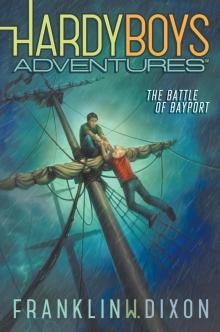 The Battle of Bayport
The Battle of Bayport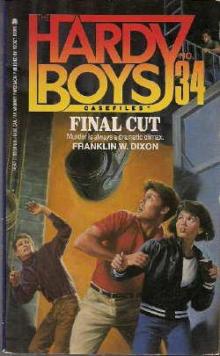 Final Cut
Final Cut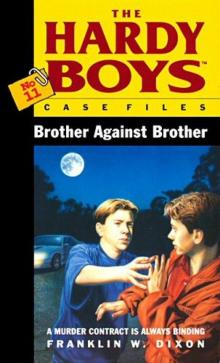 Brother Against Brother
Brother Against Brother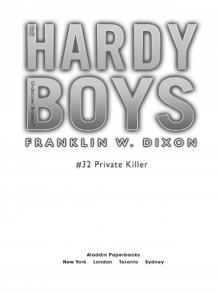 Private Killer
Private Killer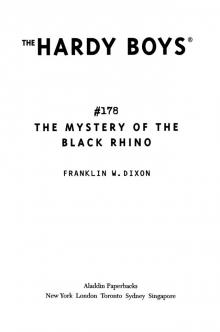 The Mystery of the Black Rhino
The Mystery of the Black Rhino Feeding Frenzy
Feeding Frenzy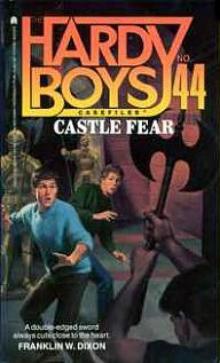 Castle Fear
Castle Fear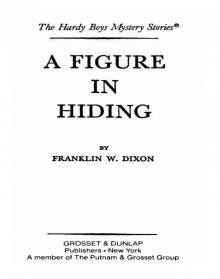 A Figure in Hiding
A Figure in Hiding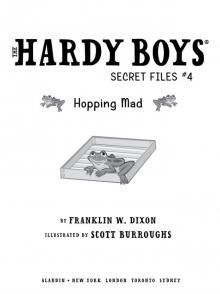 Hopping Mad
Hopping Mad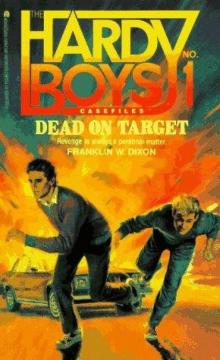 Dead on Target
Dead on Target Skin and Bones
Skin and Bones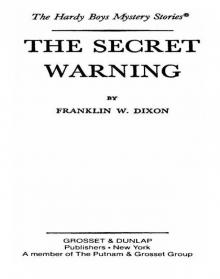 The Secret Warning
The Secret Warning Flesh and Blood
Flesh and Blood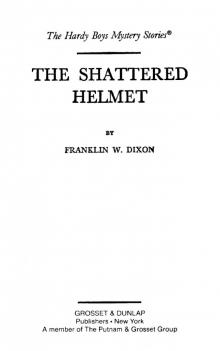 The Shattered Helmet
The Shattered Helmet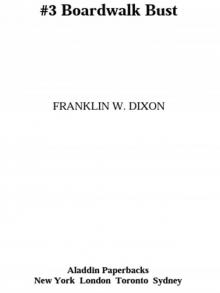 Boardwalk Bust
Boardwalk Bust Terror at High Tide
Terror at High Tide In Plane Sight
In Plane Sight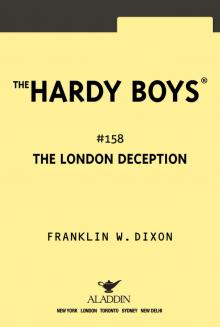 The London Deception
The London Deception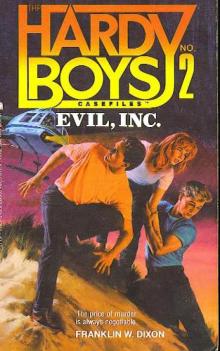 Evil, Inc.
Evil, Inc.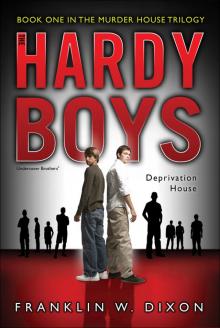 Deprivation House
Deprivation House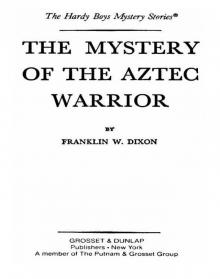 The Mystery of the Aztec Warrior
The Mystery of the Aztec Warrior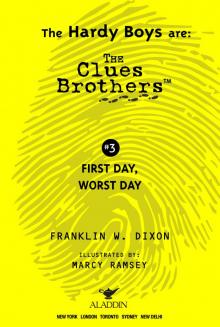 First Day, Worst Day
First Day, Worst Day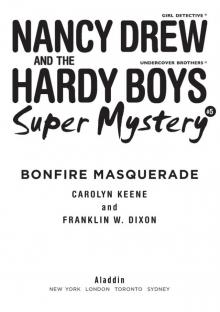 Bonfire Masquerade
Bonfire Masquerade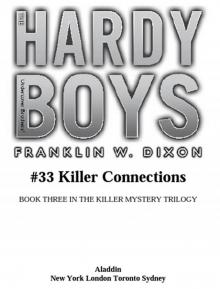 Killer Connections
Killer Connections Strategic Moves
Strategic Moves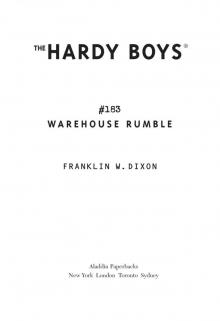 Warehouse Rumble
Warehouse Rumble The Chase for the Mystery Twister
The Chase for the Mystery Twister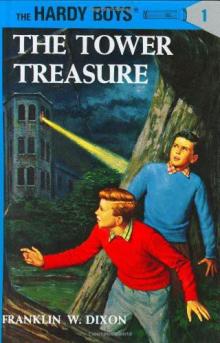 The Tower Treasure thb-1
The Tower Treasure thb-1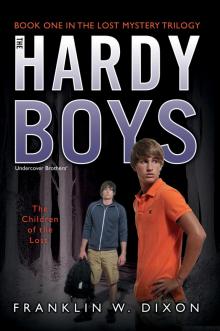 The Children of the Lost
The Children of the Lost The Last Laugh
The Last Laugh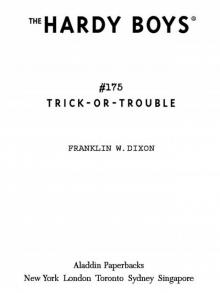 Trick-or-Trouble
Trick-or-Trouble Perfect Getaway
Perfect Getaway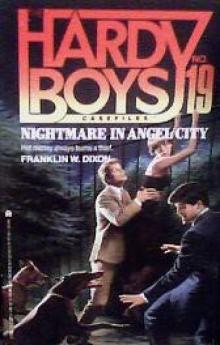 Nightmare in Angel City
Nightmare in Angel City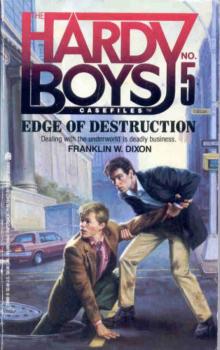 Edge of Destruction
Edge of Destruction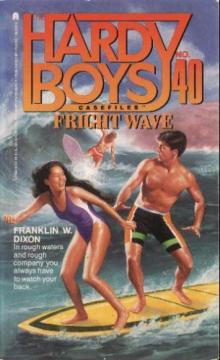 Fright Wave
Fright Wave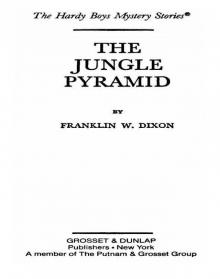 The Jungle Pyramid
The Jungle Pyramid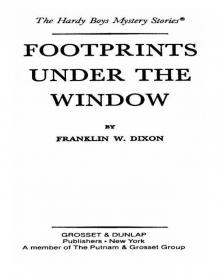 Footprints Under the Window
Footprints Under the Window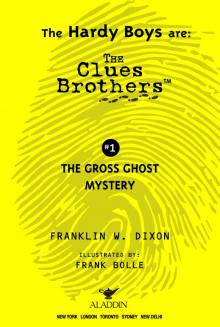 The Gross Ghost Mystery
The Gross Ghost Mystery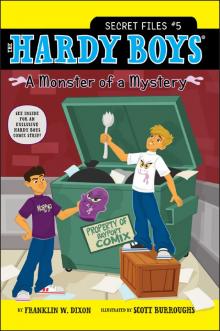 A Monster of a Mystery
A Monster of a Mystery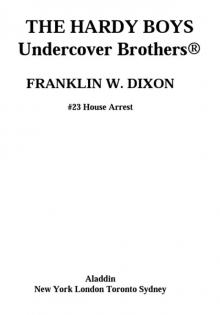 House Arrest
House Arrest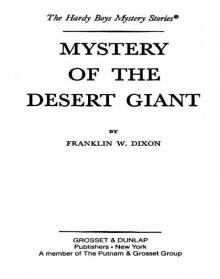 Mystery of the Desert Giant
Mystery of the Desert Giant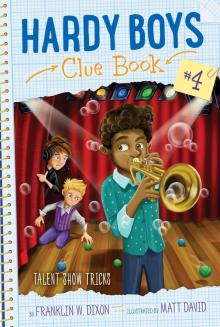 Talent Show Tricks
Talent Show Tricks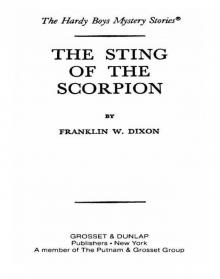 The Sting of the Scorpion
The Sting of the Scorpion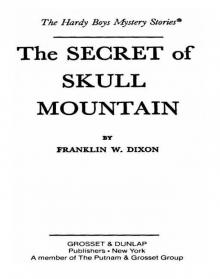 The Secret of Skull Mountain
The Secret of Skull Mountain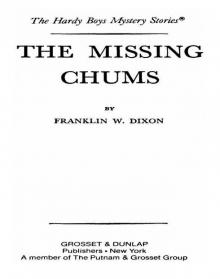 The Missing Chums
The Missing Chums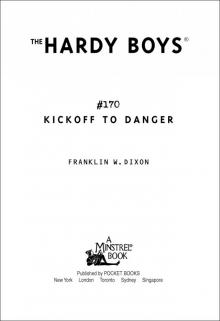 Kickoff to Danger
Kickoff to Danger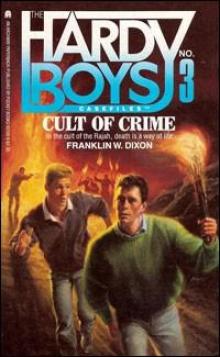 Cult of Crime
Cult of Crime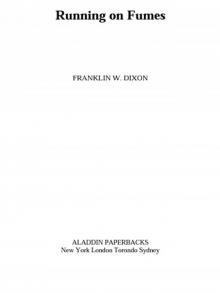 Running on Fumes
Running on Fumes Martial Law
Martial Law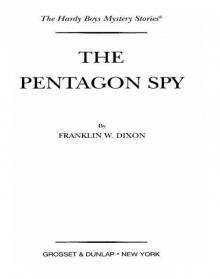 The Pentagon Spy
The Pentagon Spy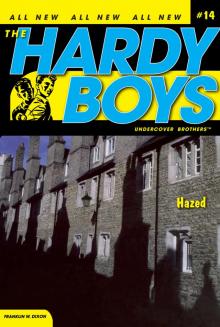 Hazed
Hazed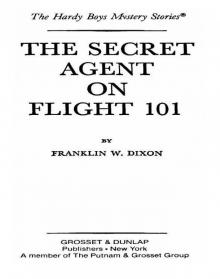 The Secret Agent on Flight 101
The Secret Agent on Flight 101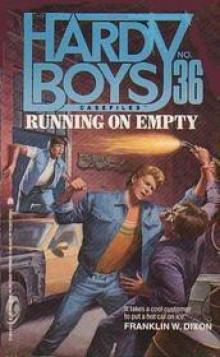 Running on Empty
Running on Empty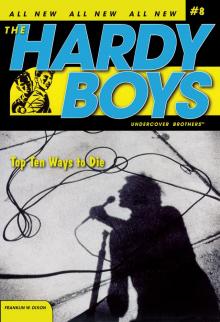 Top Ten Ways to Die
Top Ten Ways to Die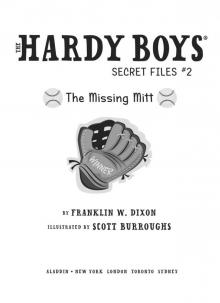 The Missing Mitt
The Missing Mitt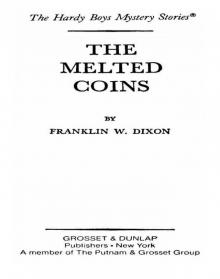 The Melted Coins
The Melted Coins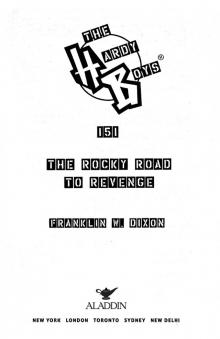 The Rocky Road to Revenge
The Rocky Road to Revenge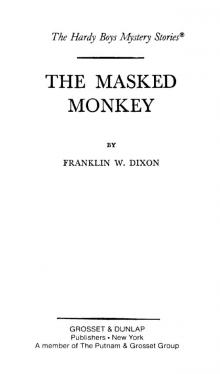 The Masked Monkey
The Masked Monkey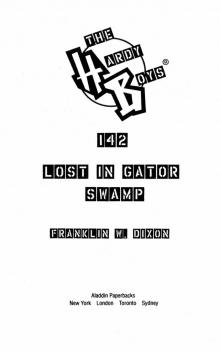 Lost in Gator Swamp
Lost in Gator Swamp Extreme Danger
Extreme Danger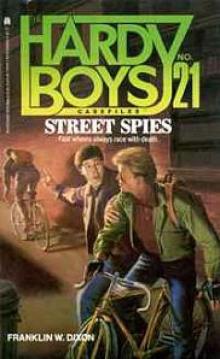 Street Spies
Street Spies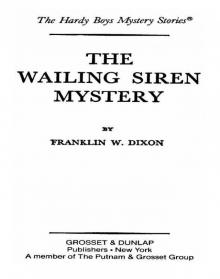 The Wailing Siren Mystery
The Wailing Siren Mystery The Dangerous Transmission
The Dangerous Transmission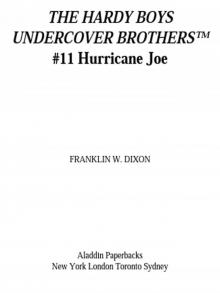 Hurricane Joe
Hurricane Joe The Crisscross Crime
The Crisscross Crime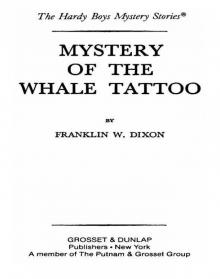 Mystery of the Whale Tattoo
Mystery of the Whale Tattoo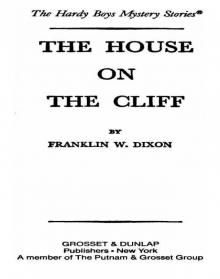 The House on the Cliff
The House on the Cliff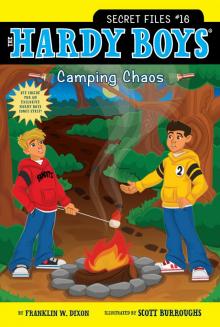 Camping Chaos
Camping Chaos Ghost of a Chance
Ghost of a Chance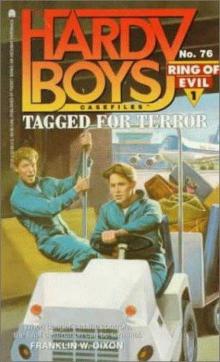 Tagged for Terror
Tagged for Terror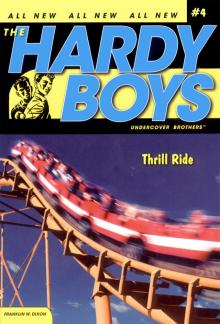 Thrill Ride
Thrill Ride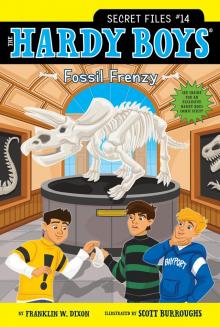 Fossil Frenzy
Fossil Frenzy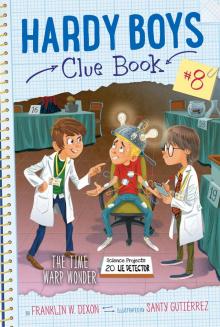 The Time Warp Wonder
The Time Warp Wonder Ghost Stories
Ghost Stories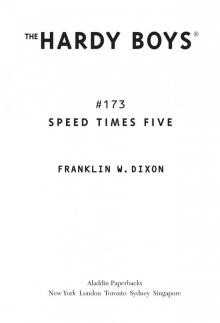 Speed Times Five
Speed Times Five What Happened at Midnight
What Happened at Midnight Three-Ring Terror
Three-Ring Terror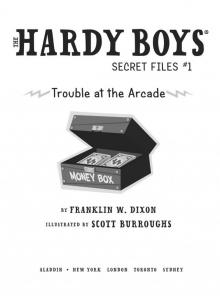 Trouble at the Arcade
Trouble at the Arcade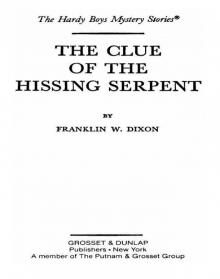 The Clue of the Hissing Serpent
The Clue of the Hissing Serpent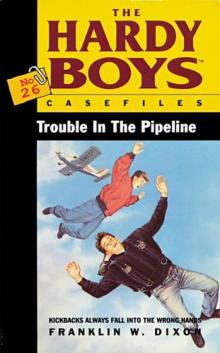 Trouble in the Pipeline
Trouble in the Pipeline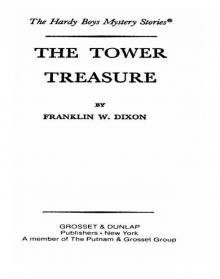 The Tower Treasure
The Tower Treasure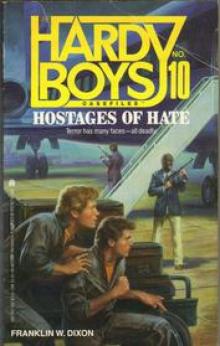 Hostages of Hate
Hostages of Hate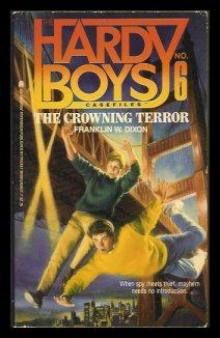 The Crowning Terror
The Crowning Terror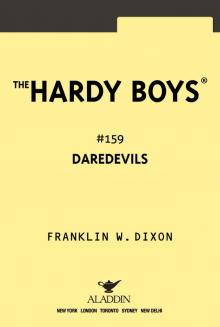 Daredevils
Daredevils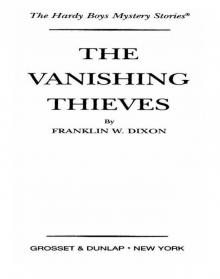 The Vanishing Thieves
The Vanishing Thieves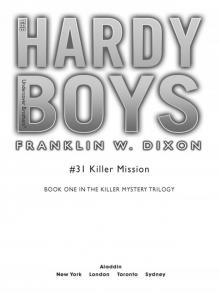 Killer Mission
Killer Mission The Mark of the Blue Tattoo
The Mark of the Blue Tattoo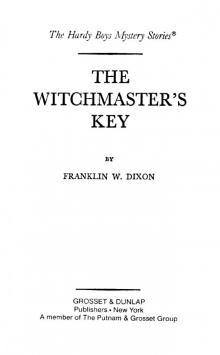 The Witchmaster's Key
The Witchmaster's Key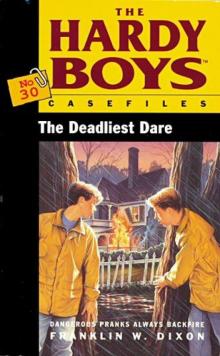 The Deadliest Dare
The Deadliest Dare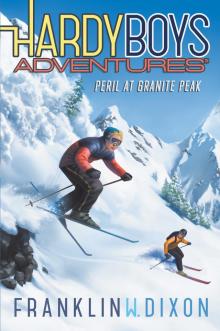 Peril at Granite Peak
Peril at Granite Peak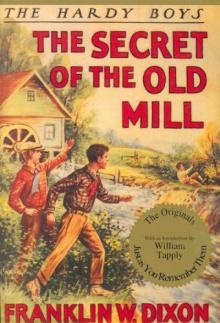 The Secret Of The Old Mill thb-3
The Secret Of The Old Mill thb-3 Rocky Road
Rocky Road The Demolition Mission
The Demolition Mission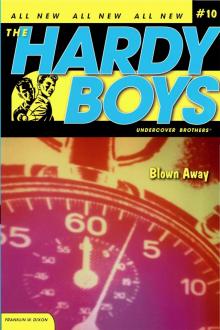 Blown Away
Blown Away Passport to Danger
Passport to Danger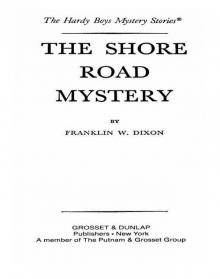 The Shore Road Mystery
The Shore Road Mystery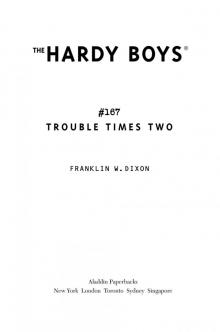 Trouble Times Two
Trouble Times Two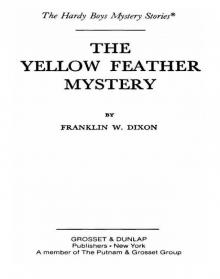 The Yellow Feather Mystery
The Yellow Feather Mystery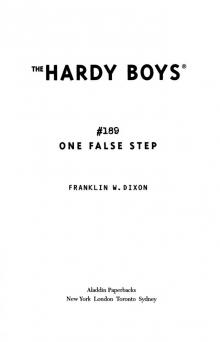 One False Step
One False Step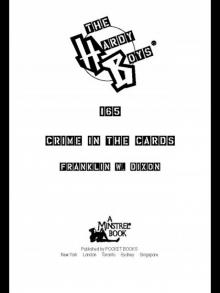 Crime in the Cards
Crime in the Cards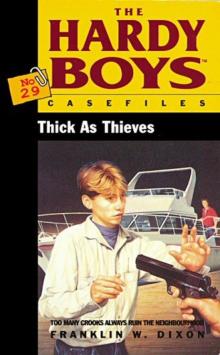 Thick as Thieves
Thick as Thieves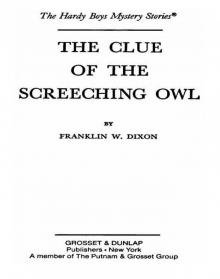 The Clue of the Screeching Owl
The Clue of the Screeching Owl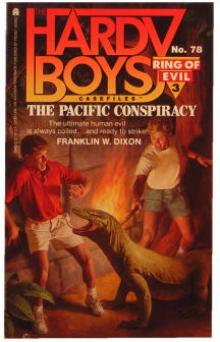 The Pacific Conspiracy
The Pacific Conspiracy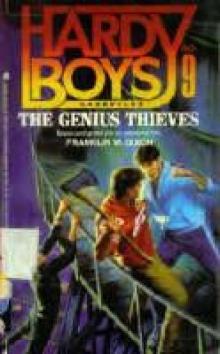 The Genius Thieves
The Genius Thieves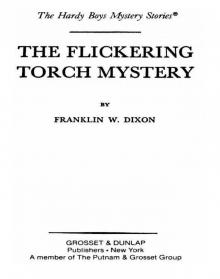 The Flickering Torch Mystery
The Flickering Torch Mystery Into Thin Air
Into Thin Air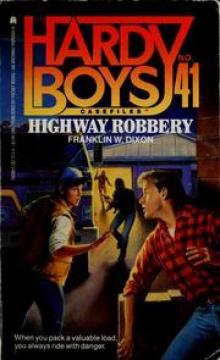 Highway Robbery
Highway Robbery Deadfall
Deadfall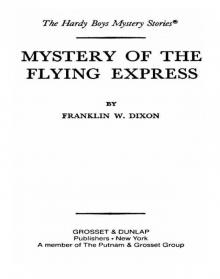 Mystery of the Flying Express
Mystery of the Flying Express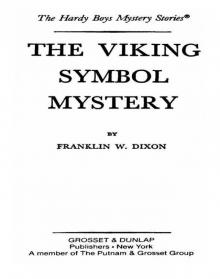 The Viking Symbol Mystery
The Viking Symbol Mystery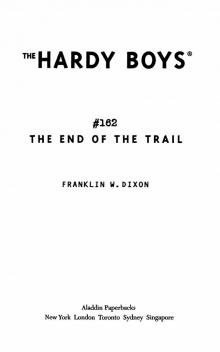 The End of the Trail
The End of the Trail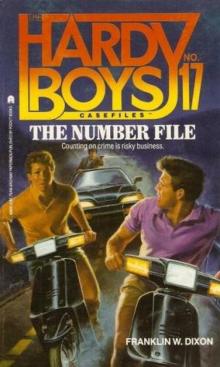 The Number File
The Number File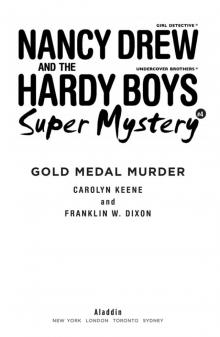 Gold Medal Murder
Gold Medal Murder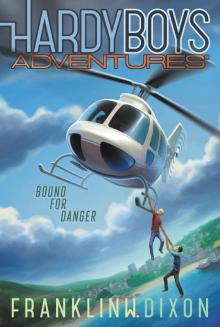 Bound for Danger
Bound for Danger Collision Course
Collision Course The Madman of Black Bear Mountain
The Madman of Black Bear Mountain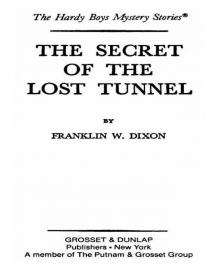 The Secret of the Lost Tunnel
The Secret of the Lost Tunnel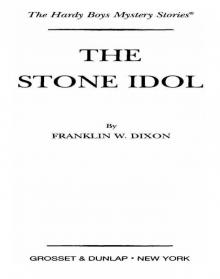 The Stone Idol
The Stone Idol The Secret of Pirates' Hill
The Secret of Pirates' Hill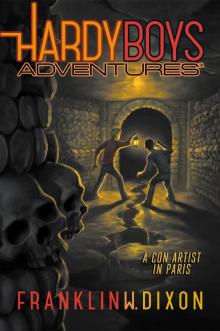 A Con Artist in Paris
A Con Artist in Paris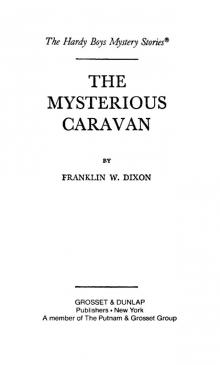 The Mysterious Caravan
The Mysterious Caravan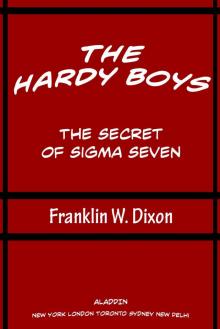 The Secret of Sigma Seven
The Secret of Sigma Seven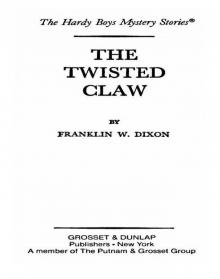 The Twisted Claw
The Twisted Claw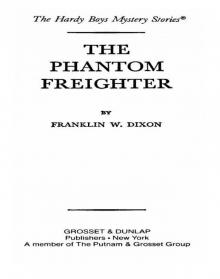 The Phantom Freighter
The Phantom Freighter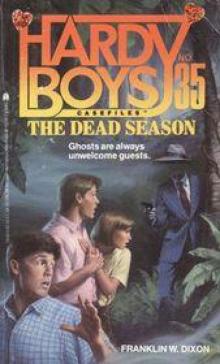 The Dead Season
The Dead Season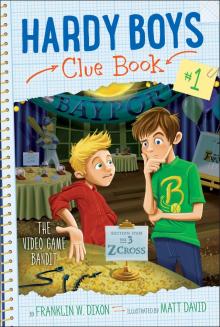 The Video Game Bandit
The Video Game Bandit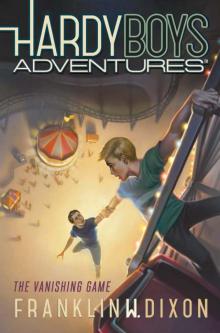 The Vanishing Game
The Vanishing Game Typhoon Island
Typhoon Island